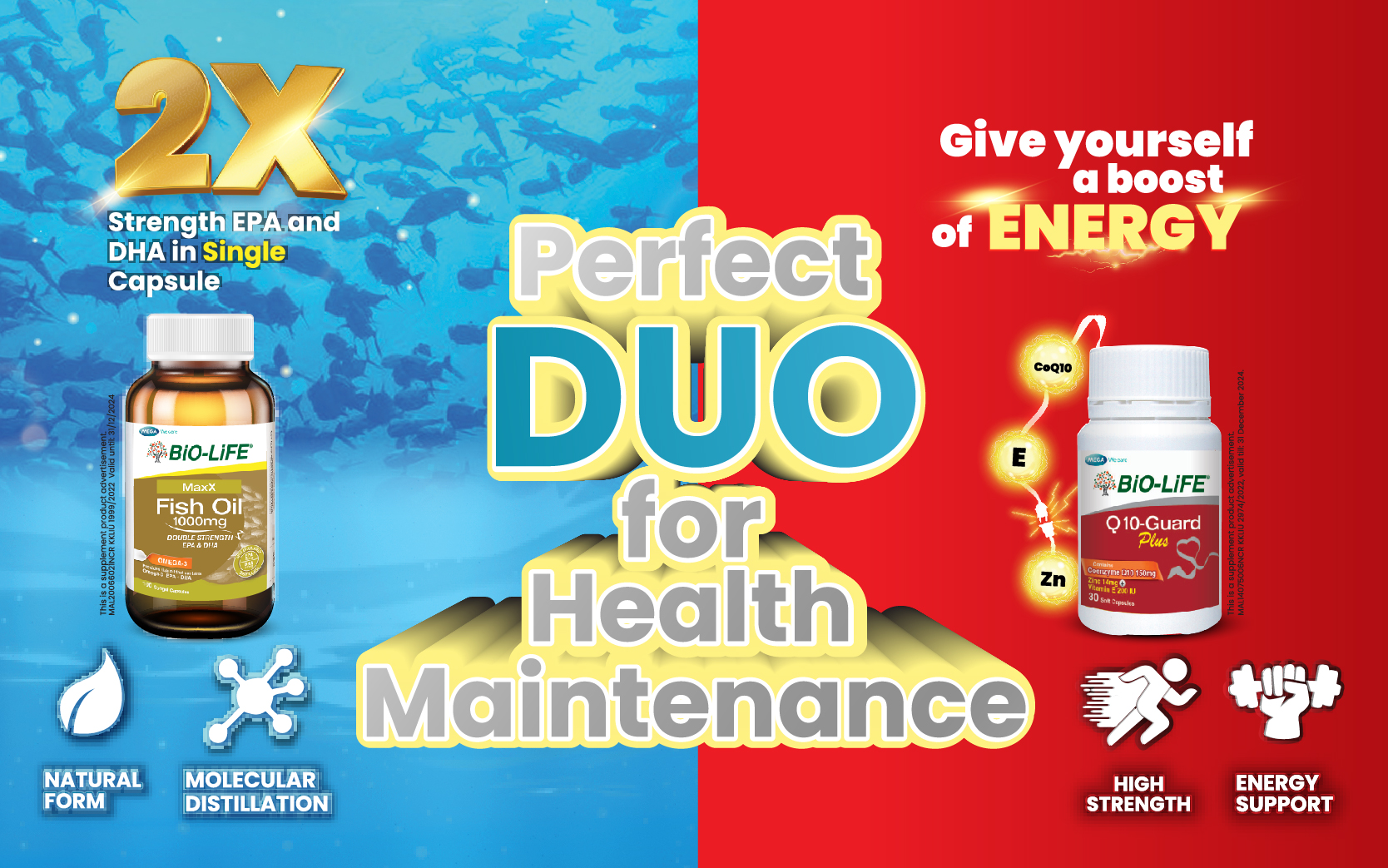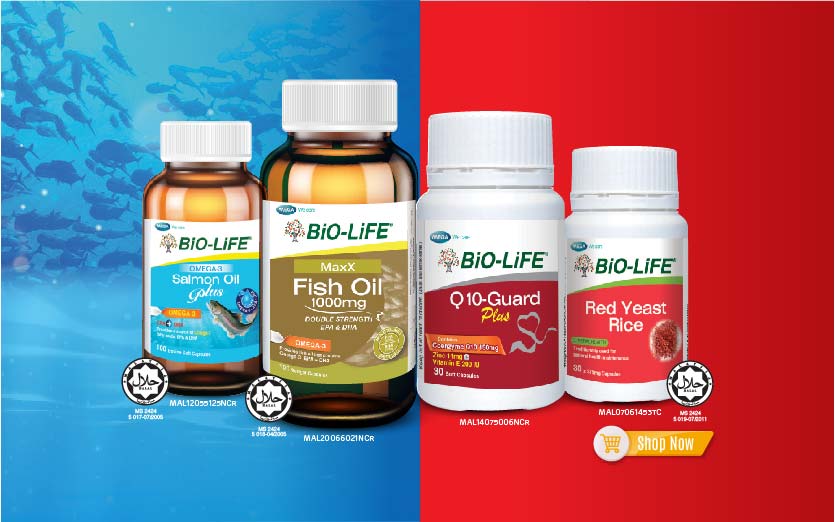
Coenzyme Q10 and Omega 3 – Work Hand In Hand In Promoting Heart Health
May 8, 2023
Introduction
Have you ever wonder what is it that kept you alive by continuously pumping blood when you eat, sleep, work or even when you are reading this right now? Yes, your heart! This wonderful organ can do so much more beyond its small fist-size by beating about 10 thousand times per day, 35 million times per year, and 2.5 billion times over the average lifetime in your body1!
Sadly, many people take it for granted and often forgotten the fact that like our other organs, it too, needs to be taken care of. According to the Department of Statistics Malaysia, ischaemic heart disease has been the number one killer since 2010 with an average of 50 Malaysian died of heart condition each day2. Poor lifestyle and eating habits are the key factors of cardiovascular disease occurrence.
How to promote heart health in everyday life?
Clinically proven to be the guardian of a healthy heart, Coenzyme Q10 (CoQ10) and fish oil are well-known nutrients that must not be neglected in our daily requirement! They can help to promote heart health in everyday life.
What are CoQ10 and Omega-3?
CoQ10 is a vitamin-like substance that produces naturally in the body. From food sources, it is mostly found in oily fish, organ meats and whole grains. It exists in two forms: ubiquinone (for energy) and ubiquinol (as an antioxidant). While omega-3 is an essential fatty acid that cannot be produced by the body naturally and must be obtained through diet. It is only found in deep-sea fish, such as salmon, sardine and anchovy, as well as plant, including flaxseed, chia seed and walnut.
The roles of Coenzyme Q10 (CoQ10) and Omega-3 Fish Oil in maintaining heart health
CoQ103,4

- Heart has the highest concentration of CoQ10
- Facilitate adenosine triphosphate (ATP)
production to generate energy (like a BATTERY) - Powerful antioxidant to protect cells from oxidative damage
- CoQ10 deficiencies is associated with cardiovascular disease
Omega-3 Fish Oil5

- Help in lowering triglyceride level
- Regulate the level of inflammation
- Slow down the plaque formation in arteries
- Lower the blood pressure
- Stabilize the heart’s rhythm
- Prevent blood clotting
CoQ10 and Omega-3 Fish Oil – the ‘heart’ savior!
Due to the busy lifestyle in modern days and their limited amount in natural food sources, supplements come in handy to save the day! You may try to obtain them from natural food sources and then top it up to the daily requirement through CoQ10 and Omega-3 supplements.Recommended dosage for CoQ10/day6,7
| Normal heart maintenance | 30mg to 60mg |
|---|---|
| Patients with history of chronic heart disease | 100mg to 200mg |
| Patients with heart failure | 200mg to 400mg |
Recommended dosage for Omega-3 Fish Oil/day8,9
| Normal heart maintenance | 500mg EPA+DHA |
|---|---|
| Patients with history of chronic heart disease | 1000mg EPA+DHA |
| Patients with heart failure | 2000mg to 4000mg EPA+DHA |
Conclusion
As cardiovascular diseases happened due to multiple factors such as chronic inflammation, high triglyceride level that cause plaque formation in the arteries, oxidative damage, high blood pressure and even lack of energy for heart function, hence, CoQ10 and omega-3 fish oil should be taken into consideration to supplement the body to improve heart health. As the saying goes, prevention is better than cure, perform your healthy-heart maintenance and disease prevention before it is too late! Find out more about CoQ10 and Omega-3 Fish Oil products at https://biolife.megawecare.com/heart-blood-circulation/
Shop Now
References
- Publishing, H. (n.d.). Heart Health. Retrieved July 30, 2020, from https://www.health.harvard.edu/topics/heart-health
- MAHIDIN, M., DATO’ SRI DR. (2019). PRESS RELEASE STATISTICS ON CAUSES OF DEATH, MALAYSIA, 2019. Retrieved July 30, 2020, from https://www.dosm.gov.my/v1/index.php?r=column/pdfPrev&id=RUxlSDNkcnRVazJnakNCNVN2VGgrdz09
- Garrido-Maraver, J., Cordero, M. D., Oropesa-Avila, M., Vega, A. F., de la Mata, M., Pavon, A. D., … & de Lavera, I. (2014). Clinical applications of coenzyme Q10. Front Biosci (Landmark Ed), 19(4), 619-633.
- Sharma, A., Fonarow, G., Butler, J., Ezekowitz, J., & Felker, G. (2016). Coenzyme Q10 and Heart Failure. Retrieved July 30, 2020, from https://www.ahajournals.org/doi/full/10.1161/CIRCHEARTFAILURE.115.002639
- Ellulu, M. S., Khaza’ai, H., Abed, Y., Rahmat, A., Ismail, P., & Ranneh, Y. (2015). Role of fish oil in human health and possible mechanism to reduce the inflammation. Inflammopharmacology, 23(2-3), 79-89.
- Al-Hasso, S. (2001). Coenzyme Q10: A Review. Hospital Pharmacy, 36(1), 51-66. doi:10.1177/001857870103600107
- Hidaka, T., Fujii, K., Funahashi, I., Fukutomi, N., & Hosoe, K. (2008). Safety assessment of coenzyme Q10 (CoQ10). Biofactors, 32(1‐4), 199-208.
- GOED Recommendation for EPA + DHA. (n.d.). Retrieved July 27, 2020, from https://www.issfal.org/goed-recommendations-for-epa-dha
- Vannice G and Rasmussen H (2014). Position of the academy of nutrition and dietetics: dietary Fatty acids for healthy adults. J Acad Nutr Diet 2014. 114:136-153. Retrieved from: http://download.journals.elsevierhealth.com/pdfs/journals/22122672/PIIS2212267213016729.pdf







